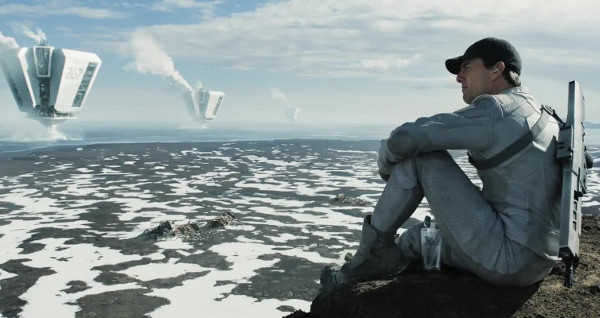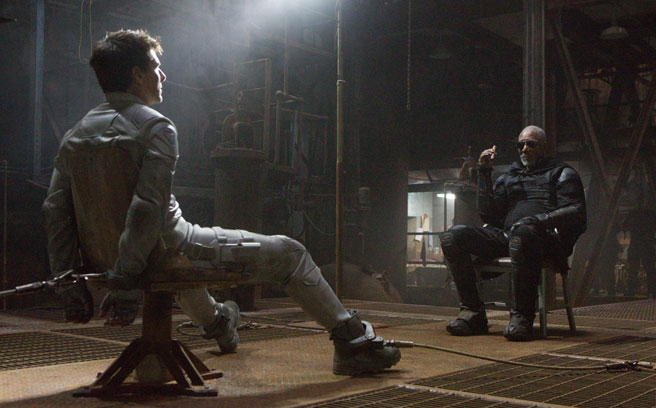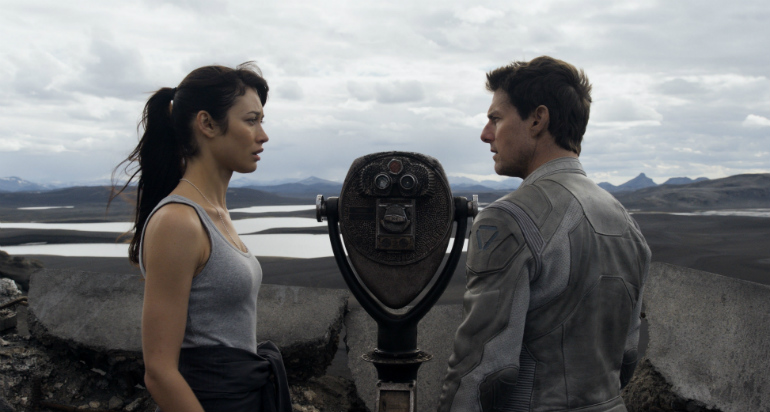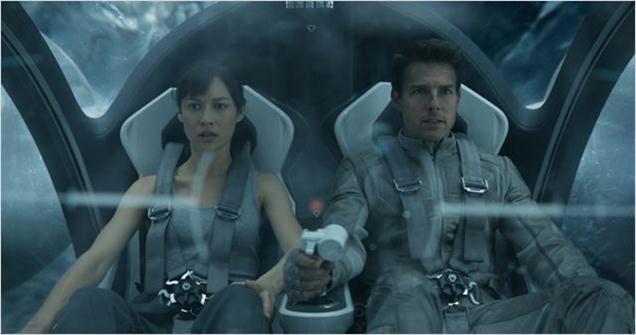|
Is Hollywood still capable of
writing interesting characters? It's distressing how rapidly mainstream
films
are losing touch with the opening thirty minutes of a story, failing to
engage
us with detailed characterisation, interesting backstories and personal
motives
to drive the character's personal reasons for their journey. Character
development is reduced for the sake of action because studios doubt the
attention span of audiences.
Oblivion
was based on an unpublished graphic
novel by the film's director Joseph Kosinski (TRON: Legacy)
and is inexcusable for its dreary writing and vacuous
characters. Peaking just over the two hour mark and featuring a rich
cast, this
is should have been brimming with personality and energy. Instead, this
is a
long, dry, waste of talent, prioritising its leading man's stunt
capabilities
over its tired science fiction tropes.

In the year 2077, Tom Cruise plays space
soldier Jack, whose voice-over tells us that the Moon has been
destroyed due to an
invasion on Earth by the Scavs. The Scavs lost the battle in a nuclear
war,
which means that Jack and Victoria (Andrea Riseborough), living on a
penthouse
above the ruins of the Earth, and are tasked by Sally (Melissa Leo) to
be on
cleanup duty by repairing aerial drones and taking down remaining
Scavs.
Jack has had his memory wiped but
is still haunted by faded recollections of Julia (Olga Kurylenko), a
woman he sees in his dreams. He is also troubled by his increasingly
dangerous
missions around the Earth, discovering a conspiracy about what really
happened
and the appearance of the mysterious Beech (Morgan Freeman).

Relying singularly on Cruise proves
fatal. I don't think I've ever him this dull before. Fifty years old,
he's no
longer playing a character but an avatar that moves between stunts. His
role is
terribly written, lacking any personality or characterisation and
failing to
utilise his charisma.
With a join the dots plot, the film
is mostly action substituting story. Each of Jack's missions is a
setpiece,
with a small clue for the overall mystery tacked onto it. You can
imagine the pictures
of the graphic novel laid out in production instead of the script -
such is the
thinness of the narrative.

Someone also decided that Cruise
shouldn't be upstaged by the other actors so the female characters are
largely
distanced from the action and both Morgan Freeman and Melissa Leo are
treated
expendably. Freeman only has two or three scenes, wearing a silly
outfit of a
cloak and sunglasses, smoking a cigar, while she's left to being a
talking head
on a computer screen.
Kosinski has said that the film is
about love, because of a familiar subplot involving a forgotten love
interest, but
that's unjustifiable when the lead is surrounded by two equally bland
women
with no chemistry between them. Their dialogue is dull, stilted space
jargon,
which fails to add any feeling or warmth.

Among the many science fiction
clichés are clones, mole people, and
oppressive computers, thinking by themselves. The only original facet I
considered was whether there was a social comment about unmanned
military
drones attacking people, which is admittedly a rather timely thought.
It seemed
more interesting than the superfluous and tensionless action, where
Jack is
able to survive multiple falls and injuries.
Some might debate the complexity of
the film's survivalist and dystopian themes, but where is the
emotional
hook? Before a film can engage you with
its concepts, it must allow you to invest in its characters, which can
then be
used as an embodiment of the themes themselves. Without this
attachment, Oblivion is an interminable crawl and the
worst that can be said about the film is that despite borrowing heavily
from The Matrix and Inception, its
ideas dissolve from your mind as quickly as the
film.
|